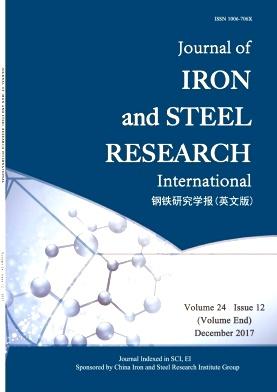Microstructure evolution and mechanical properties influenced by austenitizing temperature in aluminum-alloyed TRIP-aided steel
Abstract
The Fe-0. 21C-2. 2Mn-0. 49Si-1. 77 A1 transformation induced plasticity (TRIP)-aided steel was heat treated at various austenitizing temperatures under both TRIP-aided polygonal ferrite type (TPF) and annealed martensite matrix (TAM) processes. The microstructure evolution and their effects on mechanical properties were systematically investigated through the microstructure observation and dilatometric analysis. The microstructure homogeneity is improved in TPF steel heated at a high temperature due to the reduced banded martensite and the increased bainite. Compared with the mechanical properties of the TPF steels, the yield strength and elongation of the TAM steels are much higher, while the tensile strength is lower than that of TPF steels. The stability of intercritical austenite is affected by the heating temperature, and thus the following phase transformation influences the mechanical properties, such as the bainite transformation and the precipitation of polygonal ferrite. Obvious dynamic bainite transformation occurs at TAM850, TAM900 and TAM950. More proportion of polygonal ferrite is found in the sample heated at 950 °C. The bainite transformation beginning at a higher temperature results in the wider bainitic ferrite laths. The more proportion of polygonal ferrite and wide bainitic ferrite laths commonly contribute to the lower strength and better elongation. The uniform microstructure with lath-like morphology and retained austenite with high average carbon content ensures a good mechanical property in TAM850 with the product of strength and elongation of about 28 GPa · %.

 求助内容:
求助内容: 应助结果提醒方式:
应助结果提醒方式:


